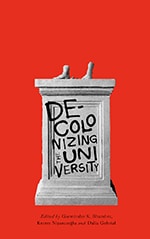 Many universities worldwide hope to internationalize and push faculty to produce knowledge across disciplines. That’s easier said than done.
Many universities worldwide hope to internationalize and push faculty to produce knowledge across disciplines. That’s easier said than done.
My guest today, Angela Last, looks at these university fads and finds difficult ethical dilemmas that scholars must overcome.
Angela Last is Lecturer in Human Geography at the University of Leicester. Angela is an interdisciplinary researcher in the field of political ecology, drawing on her background in art & design and science communication to investigate environmental controversies and geographical knowledge production. She has been writing the blog Mutable Matter since 2007.
The chapter discussed in today’s podcast was published in Decolonizing the University (2018, Pluto Press).
Citation: Last, Angela, interview with Will Brehm, FreshEd, 130, podcast audio, October 15, 2018. https://www.freshedpodcast.com/last/
Transcript, Translation, Resources:
Will Brehm 0:56
Angela Last, welcome to FreshEd.
Angela Last 0:58
Thank you for having me.
Will Brehm 0:59
Today many universities are embracing this idea of “internationalization”. How would you go about defining that term with respect to universities?
Angela Last 1:19
It is quite interesting how the term is being defined versus how the term is being put into practice. The definition if you look at different universities, internationalization strategies are usually part of the general list of university strategies, and it’s usually about research and teaching, and sort of how to reflect a more global university. And I think they usually define it in terms of creating a more global environment – something that is in tune with the globalized world, both in terms of research and teaching. But in practice, it’s usually quite economically driven. So it gives quite an interesting, I would say “dissonance”, partly because a lot of the activities about making new curriculum more inclusive, for instance, or sort of what people call “diversifying the curriculum”, is quite disconnected from efficient strategies that differ from university to university.
Will Brehm 2:07
In what way would it differ?
Angela Last 2:09
So sometimes it’s more like a bottom up movement from activists, educators and students who are arguing almost against, I come to say, universities. I think, again, it differs sometimes people arguing against effectively. I mean, there’s another thing that plays into that, which is another kind of dissonance, which is quite interesting is that universities … I mean, I’m here based in the UK. So, you know, universities are trying to sell a British curriculum to overseas students, but at the same time, they want to expand the market to non-white UK students. And so then there’s a demand, for instance, in the curriculum not only includes white authors, like it’s been done for a long time, especially white male authors. And there’s a bit of a dissonance because on the one hand, universities are catering to expectations of the white British education versus then this is the exact opposite, basically. And economic concerns that can create some kind of interesting, let’s say, call it that conditions.
Will Brehm 3:12
So what you’re kind of saying here is that there’s the universities, there’s management levels, there’s the administrators, who are putting together these strategic plans that have in a sense, very empty rhetoric around internationalization, world class universities and excellence and whatever those end up meaning is quite vague and difficult to necessarily define. So you’re you’re kind of making a point that these administrators, what they see as the value of internationalization, is actually sort of the economic side of it. Is that what you’re sort of saying?
Angela Last 3:46
I mean, because of the increasing privatization of the university, economics, I think the driving factor for pretty much anything. And because the universities have to survive. And in the current economic climate … I started education in the UK in 1998, which was exactly the year when they introduced tuition fees. So I mean, things have been going on a bit before, but I think people are still experimenting more than they perhaps have been in other countries, such as the US, where they have had tuition fees for a longer time, and it’s a slightly different system and political setup.
Will Brehm 4:24
So in terms of, say, UK universities, how does internationalization actually increase money coming into the university?
Angela Last 4:34
International students have to pay very high fees and in addition, UK universities have started to have either collaborations with, for instance, Chinese universities, or they have their own campuses abroad to be able to tap into that market, really.
Will Brehm 4:51
So it’s just about getting more students into these universities?
Angela Last 4:55
Effectively, yes.
Will Brehm 4:56
On the one hand, that is obviously an issue, but what you’re also saying is that there’s sort of this bottom up approach where educators see a value in diversifying curriculum, of internationalizing the university. So can you talk a little bit more about what does that look like from an educator’s perspective? What is the value of internationalization?
Angela Last 5:18
One of the first things I do when I start at a new university, or when I speak to colleagues from other universities who are interested in working on what they call internationalizing the curriculum and diversifying, or some people call it “decolonizing”, which is a very problematic term, also some other names, is kind of to look at internationalization strategies. This is to get a sense of what the university is, or how they are portraying themselves. But the educators interested, in this case, in presenting knowledge differently than it is currently portrayed in other places, I think a lot of bottom up movements have quoted a “whitewashed curriculum” where various white, US centric education doesn’t acknowledge a lot of the links that have shaped European knowledge from other parts of the world. I mean, you can go quite far back in history, for instance with some sort of history of science point where often people teach say quantitative methods or something, they go back to the Greeks. But I mean, it’s not that the Greeks have existed in isolation and there was no Middle Eastern people who worked on this before. And also, again, a lot of the European enlightenment and Renaissance was due to a large degree because of refugees effectively from the Middle East, and sort of the Roman Empire effectively dissolved. Anyway, you can go as far back as this, but as recent examples, when you look at a topic, like once I was doing some jumping in this from teaching, and I looked at colleagues’ self-purpose, and there was a topic on globalization, and all the authors were white middle class men.
There are people who have published in English and who are from particular countries. Again, that wasn’t the only case that I could name. I could name so many authors who have also written much more interesting stuff. And why are they not on the syllabus? And it’s often connected to either how people have been taught themselves. If you think about how you put together syllabus, and where your knowledge comes from, what you know. Yes, there is a lot of relative influences that need to be considered.
Will Brehm 7:36
So I want to ask a little bit about why universities are trying to internationalize, but not necessarily at that management level. But, why are universities at the educator level really trying to put into practice internationalization?
Angela Last 7:54
I think it is because there is an ongoing alienation of students of color at the university. Like black students, British Asian students, not just because of curriculum issues, but generally, university practices. So educators want to create a higher sensitivity, and to a lot of these issues, by increasing a number of initiatives at British universities to work on this.
Will Brehm 8:22
What sort of challenges do these educators face when they are trying to change that alienation of students of color?
Angela Last 8:29
I mean, sometimes it is that people, for instance myself are not aware of certain processes that do alienate students. Like, for instance, at Leicester, my colleague Margaret Byron is working on increased access to students societies, for instance. I mean, she’s just been writing about this to give more practical advice. And I think we’re too used to basically to what we’re doing at universities, not looking at how. I mean, it is not just the issue of race or religion, I think it is also an issue of class that plays into it, and how traditional universities have been there to effectively shape or create or maintain an elite. So we have to be mindful of how these practices are still at play, and how we unwittingly sometimes participate in them. And sometimes we actually, it’s not so unconscious, it’s itself connected to either our own background, so what we’re used to, or because of the pressures that are on us in terms of our making a career in education.
Will Brehm 9:39
So I want to ask a little bit about another, I don’t know “fad” in higher education, like internationalisation. Another fad that we, or I, see often is “interdisciplinarity”, where there is a push to have scholars do interdisciplinary work. Can you tell me what that actually means in your opinion?
Angela Last 10:00
I think interdisciplinarity is quite a … I mean, I consider myself interdisciplinary scholar, having come from art school, and having ended up in geography. I also feel I embody that kind of conflict. I mean, it is often argued that it is the growing complexity of problems that are out there in the world that necessitate a greater collaboration between disciplines. So it has been argued that because of this, the boundaries between disciplines are becoming a bit blurred, but also, again, I think there’s an economic component to it because of the … I mean, knowledge is still effectively tied to economic competition. So for innovation is also playing into that. And interdisciplinarity is part of this drive towards innovation that translates into economic success.
Will Brehm 11:02
And so what what is this interdisciplinarity actually look like in practice, for maybe some listeners who don’t really comprehend the idea, or can’t visualize it, see it as like some example of it in practice.
Angela Last 11:16
So since art/science collaboration, so you have artists working with scientists to sort of visualize a scientific issue, or sometimes even have the scientists and their research with some new techniques, insights, something like this for instance. There is a lot of work also quite helpful coming out in science studies, from medics from humanities, something like this.
Will Brehm 11:43
And is there any connection between interdisciplinarity and internationalization?
Angela Last 11:47
To me there is, both in terms of having to deal with the kind of power relationships and economic pressures that are inherent in current academic life, but also because often they are connected in terms of large transnational grants; they often involve an interdisciplinary component.
Will Brehm 12:09
So grants actually say you need to be interdisciplinary?
Angela Last 12:13
Easily. Interdisciplinary and international. I mean, I think kind of how they level up in terms of monetary terms.
Will Brehm 12:20
So a grant would be more likely to be funded, or could get more money, if it was international and interdisciplinary?
Angela Last 12:28
Yes, especially because a lot of the research is directed at what’s framed by research councils as “global challenges”. For instance, in the UK, we have a Global Challenges Research Fund, which explicitly funds research between Britain and what are considered low-income countries with specific problems, and the fund for instance has been under scrutiny from 50 black academic citizens. Patricia Noxolo, who is written a paper on the problems of this fund.
Will Brehm 13:04
What are some of these problems? I mean, having an international component and an interdisciplinary component might sound pretty good, per se, especially if, as you said earlier, problems in the world today are becoming more complex and we need to approach these problems from an interdisciplinary perspective. I mean, that seems pretty good to me.
Angela Last 13:24
Yes, I think these projects can actually be really good. I mean, having a really interesting approach and make people see an issue in a new way. It’s not that I am ruling this out. It’s more that when you put such a grant together, and it’s not just how you put the grant together, but how the grant’s being advertised. So for instance, with the Global Challenges Research Fund, a lot of researchers are uncomfortable submitting to it because they feel it produces the kind of developing world relation in a way that reproduces a relationship that researchers have been highly critical of, like this kind of “white savior” thing, versus a more equal or even reverse relationship, where as we call it, the global South dictates the conditions rather than the other way around. How money is being routed, basically. I think that it used to be better in terms of how this was framed, and now people feel it has gone back to a rhetoric that they’re not comfortable with.
Will Brehm 14:30
What’s the rhetoric that people aren’t comfortable with?
Angela Last 14:35
Kind of that, as I said that how it is being seen as a global North helping the global South. I mean, I don’t have the text in front of me, but effectively the essence of that as far as I understand.
Will Brehm 14:54
So another aspect of academics today other than teaching, and how you were talking about the issues of white washing the curriculum and international students being seen through an economic lens by a lot of the management and administrators of universities to increase funds to the university, and beyond the issues of grant writing and some of the the issues of interdisciplinarity and internationalization, in terms of research, can you talk a little bit about the idea of transnational shared knowledge production, which is, it seems to be another aspect of the work that academics are supposed to do?
Angela Last 15:33
I think people have different interpretations of what shared knowledge means in terms of the relationship with their research partners. Some people see it in terms of making things accessible, making their research accessible, like open access, for instance. Some people see it as an aspect of their relationship with international partners, how you have the most equitable working relationships: So who is the principal investigator? So the grant leader, for instance. And who has what kind of say in the research conditions and especially the framing of the questions, and also the outputs. And there are many different interpretations, and actually, the chapter that I wrote was for a conference on shared knowledge production to exactly discuss what the relationship might be, or how different researchers were handling it in their research.
Will Brehm 16:30
Yes, obviously. Can you talk about an example of where a particular form of shared knowledge production is problematic and why it would be so in your opinion?
Angela Last 16:40
One of the examples I mentioned in the chapter is around publishing. Maybe not the ideal example, but for me, a lot of my awareness around … you can call it like “power relations” in research and knowledge production was participating in the making of a publication straight out of my PhD and asked to be a coeditor on a book. And then the publisher effectively said, it’s an interesting project, but we would like to make it an international publication. And I’m like “Oops!” I mean you go in quite naïve. Everything technically international, because it’s kind of out there. And then, on the other hand, again, you realize there are different approaches to this.
Will Brehm 17:26
What did the publisher expect when it came back to you saying, “We want it to be an international handbook”? What did that mean to them?
Angela Last 17:35
Well to them, it mainly meant, but they called it the Asian market at the time of negotiation it was particularly China, and I don’t think this will have changed greatly because obviously, the economic reasons. And there’s a lot of Chinese students coming to the UK, Chinese satellite campuses being opened by UK universities.
Will Brehm 17:58
So they wanted to sell the book to that point market, or did they want you to bring in scholars who are from China? Like what what did it actually look like in their mind?
Angela Last 18:06
Again, it kind of relates to what I mentioned at the beginning, that it’s a bit of a contradiction, really. So I’m not entirely sure how that sits with the publisher that on the one hand, British education is marketed as a particular thing. I don’t know how that works; I imagined it to be a bit like Harry Potter type advertising. But it’s partly also how university websites present themselves. On the other hand, it is the appeal to students. So there’s the double appeal that I think people are trying to tap into, on the one hand, what signifies “Britishness”, which is often white Britishness. Although at the same time, people want sort of an international, in inverted commas, “more colorful compass” of how they present themselves in images on the other hand. So there’s the appeal to … why people might be attracted to. But I’ve spoken to some academics, and, for instance, there’s a Senegalese colleague who said that some of the students don’t actually want to read black authors because they’re going there for a “white education”. I think the situation is more complex than saying, “We want to include these authors for market reasons.” I think the situation is more complex.
Will Brehm 19:26
So how did you navigate it? How did you basically take on that term “international handbook”, and navigate, in a sense, ethical dilemmas?
Angela Last 19:35
There were a lot of times where I just wanted to drop the project, frankly, because I found it such an ethical minefield, actually mindfield is a good word. I think initially, I was quite naive, and trying to get in touch with some people just to do some research on the internet and through other channels and snowballing to get some people on board, and then partly it was like … this is too … And I don’t know, there was something that really didn’t quite feel right, because you were asking yourself, “For what reasons am I doing this?” What are the conditions of my colleague, let’s say, if they’re working in a vastly different economic system, which doesn’t pay for their labor that technically I’m being paid for; my salary here. To be expected to publish. And it was a really fraught relationship, and sometimes you … On the one hand, prevents you from including certain people. On the other hand, you feel like these are not the right conditions in which I can include people. So in some cases, I got in touch with a publisher asked if it’s possible for payment for some people. I think, in general, I was curious about how publishers are true to their mission to internationalize, and under what conditions they are prepared to do so.
Will Brehm 20:46
And what did you find? I mean, were they willing to pay scholars from countries where academics aren’t paid to publish?
Angela Last 20:56
I think, in some cases. I do not know if it’s that’s true, but from the sense that I got, there’s increasing awareness of conditions. And it’s not that publishing houses are monolithic. They’ve got different people with different commitments sitting in them, and they have economic pressures, they’ve got some really good people, often, who are really well meaning; they’re trying to negotiate again, was higher ups and it comes to different results, partly depending on the publisher administrations or ethos or size. There are a lot of factors that play into that.
Will Brehm 21:30
And in the end, what happened? I mean, did you publish this book?
Angela Last 21:35
Yes, it got published. It took a lot of time, I think I’m still ambiguous. I think partly because I went into it not being as aware of these conditions as I should have been. So now I think taking on any publishing project, for instance the book that this chapter is in that we’re talking about. So very different publishing conditions, I really look into these things if I ever attempted to do an edited collection, or sometimes also participating in one.
Will Brehm 22:07
So given this this world of the academic in the world of the internationalized higher education institution, and the striving for shared knowledge production, transnational shared knowledge production, what in a practical sense, can we do? Based on your experiences, based on what you have learned, what sort of tips do you have for academics who are trying to navigate this minefield, as you called it earlier?
Angela Last 22:37
I think the first step for me is always to realize that although sometimes the conditions seem very top down, that you have to negotiate them to keep employment and participate in them also. To realize that you are part of the process. Although it can sometimes feel that no matter how much you are protesting against how a Research Council are framing something, there’s a choice in how you participate in research. How you frame things, how you could collaborate with people, and also there’s an increasing number of academics who get together and write reports trying to argue against certain changes that are being made at the moment. For instance, it’s not directly related, but it’s partly also related, because it relates to the privatization of the universities: the USS strikes here in the UK, which are technically around pensions, but have sparked a lot of activism around higher education in general, so I’m hoping that the momentum doesn’t stop on this one and also mobilizes people into other issues.
Also, there are groups. For instance, a lot of the authors in the decolonizing the university book that this chapter is published in, are affiliated with different initiatives, such as, for instance, people who come from international relations, they have a group – Postcolonial/Decolonial Group,or something that direction, that you can sort of join and discuss things. And in geography, we have the Race Working Group. I think there are lots of groups like this, where you can discuss things with other scholars. And I think it’s really important to have people around you to gauge things, to discuss things, also to support things. So I would argue to just get together with people – sort of find people who are invested in this and to talk to them and just to listen, especially to listen, to be on the mailing list, maybe, or sit in with debates, just to share strategies. And also maybe you can put a grant in together and do something different to show how things can be done differently.
Will Brehm 25:00
In your chapter, you also call for the “act of refusal” – that academics should embrace the idea of refusing. Can you explain what you mean by that?
Angela Last 25:13
I think it is part of that process. I mean, obviously, there are pressures because your promotion hangs on research income, on certain types of publications that may be especially connected to journals that are published in a global North, so it kind of maintains certain hierarchies. But I think people are sometimes a bit too stressed out about what they need to do, and then don’t think about enough how they still have a presence to have a lot of leeway within that. Like how they are published, what they publish. And I think to use their kind of control, that researchers still have to keep on working for a different way of producing knowledge. This is difficult, or increasingly difficult. So I have not been in higher education for long enough to make sort of epic claims, I guess. But yes, that would be my recommendation from my position; someone who has had access to other spaces due to being a professor of something may have a different sense of, especially as to how people can make committees work, or even some kind of official initiatives around gender or race equality, can often be used. Better discussion about this at a conference, sort of about “dirty practices” that you kind of mobilize internationalization strategies for better practices in education, and although that’s technically going against some of the ethics, it also kind of tries to be appropriate in the same way that a lot of internationalization is trying to reappropriate more progressive goals. So I think there’s a lot of negotiation of dirty methods that need to be employed. I think it is not possible otherwise, although I am happy to take other advice on this.
Will Brehm 27:23
Well, I think we will leave it at that, so Angela Last thank you so much for joining FreshEd. I hope that we can continue to figure out some of these dirty methods to push the universities in more just and ethically appropriate ways of behaving, and stop alienating certain types of students.
Angela Last 27:41
Thank you for having me.
The trouble of internationalization and interdisciplinarity










